National Oilwell Varco 2015 Annual Report Download - page 21
Download and view the complete annual report
Please find page 21 of the 2015 National Oilwell Varco annual report below. You can navigate through the pages in the report by either clicking on the pages listed below, or by using the keyword search tool below to find specific information within the annual report.
Table of Contents
Our operating results have fluctuated during recent years and these fluctuations may continue.
We have experienced fluctuations in quarterly operating results in the past. We cannot assure that we will realize earnings growth or that earnings in any
particular quarter will not fall short of either a prior fiscal quarter or investors’ expectations. The following factors, in addition to others not listed, may affect
our quarterly operating results in the future:
• fluctuations in the oil and gas industry;
• competition;
• the ability to service the debt obligations of the Company;
• the ability to identify strategic acquisitions at reasonable prices;
• the ability to manage and control operating costs of the Company;
• fluctuations in political and economic conditions in the United States and abroad; and
• the ability to protect our intellectual property rights.
There are risks associated with our presence in international markets, including political or economic instability, currency restrictions, and trade and
economic sanctions.
Approximately 75% of our revenues in 2015 were derived from operations outside the United States (based on revenue destination). Our foreign operations
include significant operations in Argentina, Canada, Brazil, Europe, the Middle East, China, Africa, Nigeria, Southeast Asia, Russia, Latin America and other
international markets. Our revenues and operations are subject to the risks normally associated with conducting business in foreign countries, including
uncertain political and economic environments, which may limit or disrupt markets, restrict the movement of funds or result in the deprivation of contract
rights or the taking of property without fair compensation. Government-owned petroleum companies located in some of the countries in which we operate
have adopted policies, or are subject to governmental policies, giving preference to the purchase of goods and services from companies that are majority-
owned by local nationals. As a result of these policies, we may rely on joint ventures, license arrangements and other business combinations with local
nationals in these countries. In addition, political considerations may disrupt the commercial relationships between us and government-owned petroleum
companies or oilfield service companies.
Our operations outside the United States could also expose us to trade and economic sanctions or other restrictions imposed by the United States as well as
non-U.S. Governmental Regulatory Authorities. The U.S. Department of Justice (“DOJ”), the U.S. Securities and Exchange Commission, other U.S. federal
agencies and foreign governmental authorities have a broad range of civil and criminal penalties they may seek to impose against corporations and
individuals for violations of trading sanctions laws, the Foreign Corrupt Practices Act (“FCPA”), other federal statutes, and foreign anti-bribery, anti-
corruption and trade laws. Under U.S. trading sanctions laws, the government authorities may seek to impose modifications to business practices, including
cessation of business activities in sanctioned countries, and modifications to compliance programs, which may increase compliance costs. If any of the risks
described above materialize, it could adversely impact our operating results and financial condition.
Our ability to comply with the FCPA and foreign anti-bribery laws is dependent on the success of our ongoing compliance program, including our ability to
continue to supervise, train and retain competent employees. Our compliance program also depends on the efforts of our employees to comply with
applicable law. We could be subject to sanctions and civil and criminal prosecution as well as fines and penalties in the event of a finding of a violation of
the FCPA or other anti-corruption laws by us or any of our employees. Compliance with, and changes in, laws could be costly and could affect operating
results. In addition, government disruptions could negatively impact our ability to conduct our business.
20
























